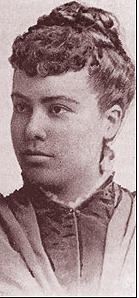


   |
Sharon's Muse.... Let's chat over coffee while I ponder some things |
About Me
My Meez 
Recent Entries
Archives
Personal
Interesting Sites
RAINE'S BLUES
GOLD MOUNTAIN
AGAIN
Need Flashplayer to view. Give time to load.
TOOL & BAD BOYS Short, Short Ebooks |
Friday, September 16, 2005 Oops...You mean she wasn't a Negro?!  It seems the Schomburg Library of Nineteenth-Century Black Women Writers, originally printed as a 40-volume set by Oxford Press, and now a prominent website, has a major oops on their hands. And their website. The supposedly black woman featured on their entry page happens to be white. It seems the Schomburg Library of Nineteenth-Century Black Women Writers, originally printed as a 40-volume set by Oxford Press, and now a prominent website, has a major oops on their hands. And their website. The supposedly black woman featured on their entry page happens to be white.Looking at the picture to the left one can see how the mistake might have been made. The picture is dark enough for the author to be mistaken as light-skinned or biracial as she obviously was by some. The picture is that of 19th century author Emma Dunham Kelley-Hawkins, who penned the novel Four Girls at Cottage City, a 1895 story set in a small New England town. The racial misidentification had gone undisputed and uncorrected for a couple of decades simply based on assumptions, including that of Henry Louis Gates, who supposedly rediscovered the "black" author. It seems no one thought to question that Four Girls featured young, blonde women and that the story never hinted at any of them being mulattos (or in today's parlance, bi-racial). People just assumed Kelley-Hawkins was "passing" and thus had made her characters white. It took the diligent curiosity of Holly Jackson, a doctoral student at Brandeis University to resolve Ms. Kelley-Hawkins's racial identity. Ms. Jackson's findings were featured in The Boston Globe under the title: “Mistaken Identity: What If a Novelist Celebrated As a Pioneer of African-American Women’s Literature Turned Out Not to Be Black at All?” In her Globe article, Jackson wrote: “Here at last, Gates explained in his foreword, were the literary ancestors of Zora Neale Hurston, Alice Walker, and Toni Morrison. With one exception, all these works had been previously out of print, making it difficult for scholars to track down copies. In fact, it was Gates’s discovery of one such ‘lost’ novel, ‘Four Girls at Cottage City’ [1895] by Emma Dunham Kelley-Hawkins, that prompted him to put these neglected texts back into print—‘in part,’ he wrote, ‘so that I could read them myself.’” Now that the mistake has been revealed, what will the Schomburg Library do? At the moment, they have decided to do nothing until they confirm Ms. Jackson's asserts to their satisfaction by talking with other scholars. Until then, Kelley-Hawkins's books will remain shelved at the library. The full story is available online at Black Issues Book Review.
|
| Layout Design by Hajira | Thanks to:Getty Images • Blogspot • Blogskins • |